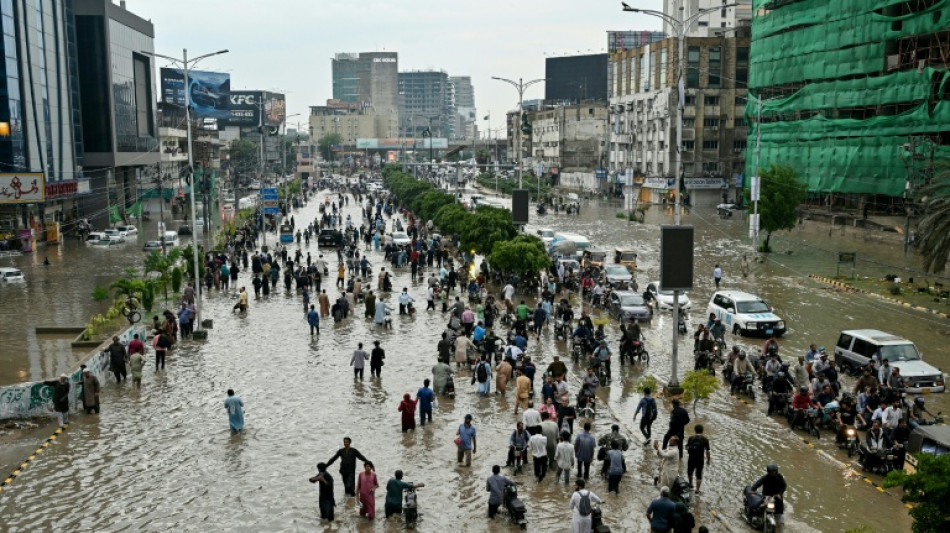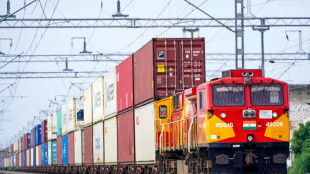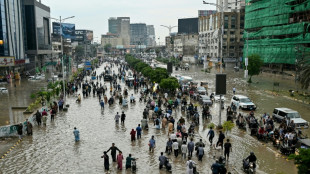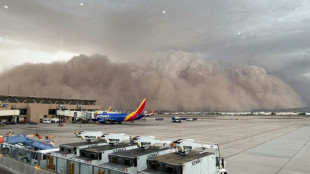
-
 Showtime for Venice Film Festival, with monsters, aliens, Clooney and Roberts
Showtime for Venice Film Festival, with monsters, aliens, Clooney and Roberts
-
Thai woman jailed for 43 years for lese-majeste freed

-
 What is swatting? Shooting hoaxes target campuses across US
What is swatting? Shooting hoaxes target campuses across US
-
Row over Bosnia's Jewish treasure raising funds for Gaza

-
 Police search Australian bush for gunman after two officers killed
Police search Australian bush for gunman after two officers killed
-
NZ rugby player who suffered multiple concussions dies aged 39

-
 Former Australian Rules player comes out as bisexual in first
Former Australian Rules player comes out as bisexual in first
-
French, German, Polish leaders to visit Moldova in show of force in face of Russia

-
 US tariffs on Indian goods double to 50% over Russian oil purchases
US tariffs on Indian goods double to 50% over Russian oil purchases
-
Feudal warlord statue beheaded in Japan

-
 Tokyo logs record 10 days of 35C or more
Tokyo logs record 10 days of 35C or more
-
Sinner, Swiatek romp through at US Open as Gauff struggles

-
 Brazil to face South Korea, Japan in World Cup build-up
Brazil to face South Korea, Japan in World Cup build-up
-
Asian markets diverge with eyes on Nvidia earnings

-
 Osaka out to recapture sparkle at US Open
Osaka out to recapture sparkle at US Open
-
China's rulers push party role before WWII anniversary

-
 Pakistan's monsoon misery: nature's fury, man's mistake
Pakistan's monsoon misery: nature's fury, man's mistake
-
SpaceX answers critics with successful Starship test flight

-
 Nightlife falls silent as Ecuador's narco gangs take charge
Nightlife falls silent as Ecuador's narco gangs take charge
-
Unnamed skeletons? US museum at center of ethical debate

-
 France returns skull of beheaded king to Madagascar
France returns skull of beheaded king to Madagascar
-
SpaceX's Starship megarocket launches on latest test flight

-
 US restaurant chain Cracker Barrel cracks, revives old logo
US restaurant chain Cracker Barrel cracks, revives old logo
-
Brazil's Bolsonaro placed under 24-hour watch ahead of coup trial verdict

-
 Taylor-Travis love story: 5 things to know
Taylor-Travis love story: 5 things to know
-
Sports world congratulates Swift and Kelce on engagement

-
 Wolves inflict more woe on West Ham, Leeds crash out League Cup
Wolves inflict more woe on West Ham, Leeds crash out League Cup
-
Venezuela deploys warships, drones as US destroyers draw near

-
 French political turmoil sends European stocks down, Wall Street edges up
French political turmoil sends European stocks down, Wall Street edges up
-
Sinner, Swiatek romp through at US Open

-
 Meta to back pro-AI candidates in California
Meta to back pro-AI candidates in California
-
Yankees-Giants set for earliest US MLB opener in 2026 schedule

-
 Messi will be game-day decision for Miami in Leagues Cup semis
Messi will be game-day decision for Miami in Leagues Cup semis
-
'Swiftie' Swiatek swats Arango, talks Taylor & Travis engagement

-
 SpaceX set once more for Starship test flight
SpaceX set once more for Starship test flight
-
Sinner begins US Open defence with quick win

-
 Who is Lisa Cook, the Fed governor Trump seeks to fire?
Who is Lisa Cook, the Fed governor Trump seeks to fire?
-
Masters updates qualifying criteria to add six national opens

-
 New era unlocked: Taylor Swift and Travis Kelce announce engagement
New era unlocked: Taylor Swift and Travis Kelce announce engagement
-
Trump to seek death penalty for murders in US capital

-
 Taylor Swift and Travis Kelce announce engagement
Taylor Swift and Travis Kelce announce engagement
-
Swiatek swats Arango, Sinner launches US Open defence

-
 Swiatek swats Arango to reach US Open second round
Swiatek swats Arango to reach US Open second round
-
Tokyo-bound Duplantis, Lyles headline Diamond League finals

-
 Trump joins backlash against US restaurant Cracker Barrel
Trump joins backlash against US restaurant Cracker Barrel
-
US revokes visa of Brazil justice minister in Bolsonaro row

-
 Leverkusen sign former Real Madrid defender Vazquez
Leverkusen sign former Real Madrid defender Vazquez
-
India's Sindhu eyes medal on return to Paris for badminton worlds

-
 British rider Turner wins Vuelta sprint as Gaudu takes race lead
British rider Turner wins Vuelta sprint as Gaudu takes race lead
-
Sci-fi skies: 'Haboob' plunges Phoenix into darkness


Pakistan's monsoon misery: nature's fury, man's mistake
Floodwaters gushing through mountain villages, cities rendered swamps, mourners gathered at fresh graves -- as Pakistan's monsoon season once again delivers scenes of calamity, it also lays bare woeful preparedness.
Without better regulation of construction and sewer maintenance, the annual downpours that have left hundreds dead in recent months will continue to kill, experts say.
Even Prime Minister Shehbaz Sharif appeared to agree as he toured flood-stricken northwestern Khyber Pakhtunkhwa province last week, where landslides killed more than 450 people.
"Natural disasters are acts of God, but we cannot ignore the human blunders," he said.
"If we keep letting influence-peddlingand corruption control building permits, neither the people nor the governments will be forgiven."
Pakistan is among the countries most vulnerable to climate change, with limited resources for adaptation.
In the devastated mountain villages the prime minister visited, and beyond, residential areas are erected near riverbeds, blocking "natural storm drains," former climate change minister Sherry Rehman told AFP.
Entrepreneur Fazal Khan now recognises the "mistake" of building too close to the river.
His home in the Swat Valley was destroyed first by 2010 floods and then again in the 2022 inundation that affected nearly four million Pakistanis.
"On August 15, once again, the floodwater surged through the channel and entered our home," the 43-year-old father said.
– Man-made mistakes –
Since it began in June, this year's monsoon has killed around 800 people and damaged more than 7,000 homes, with further downpours expected through September.
While South Asia's seasonal monsoon brings rainfall that farmers depend on, climate change is making the phenomenon more erratic, unpredictable and deadly across the region.
By the middle of this month, Pakistan had already received 50 percent more rainfall than this time last year, according to disaster authorities, while in neighbouring India, flash floods and sudden storms have killed hundreds.
Extractive practices have also compounded the climate-related disasters, with cash-strapped but mineral-rich Pakistan eager to meet growing American and Chinese demand.
Rehman, the former minister, said mining and logging have altered the natural watershed.
"When a flood comes down, especially in mountainous terrain, a dense forest is very often able to check the speed, scale and ferocity of the water, but Pakistan now only has five percent forest coverage, the lowest in South Asia," she said.
Urban infrastructure, too, has faltered.
Days after villages were swept away in the north, a spell of rain in the south brought Pakistan's financial capital, Karachi, to a standstill.
The coastal megacity -- home to more than 20 million people -- recorded 10 deaths last week, with victims electrocuted or crushed by collapsing roofs.
A Human Rights Commission of Pakistan (HRCP) report said brown water inundating streets is not only the result of rain but "clogged drains, inadequate solid waste disposal, poor infrastructure, encroachments, elitist housing societies... and so on."
Published in the wake of 2020's deadly floods, the report still rings true today.
- 'Negligence' -
According to the commission, the problems are "inherently political" as various parties use building permits to fuel their patronage networks -- often disregarding the risks of constructing on top of drainage canals.
In some areas, "the drain has become so narrow that when high tide occurs and it rains simultaneously, instead of the water flowing into the sea, it flows back into the river," urban planning expert Arif Hasan said in an interview after the 2022 floods.
In the sprawling, rapidly swelling city, the various authorities, both civil and military, have failed to coordinate urban planning, according to the rights commission.
As a result, what infrastructure does get built can solve one problem while creating others.
"Karachi isn't being destroyed by rain, but by years of negligence," said Taha Ahmed Khan, an opposition lawmaker in the Sindh provincial assembly.
"Illegal construction and encroachments on stormwater drains, along with substandard roads... have only worsened the crisis," he added.
Karachi Mayor Murtaza Wahab says he has been asking Islamabad every year for help financing the revamping of drainage canals, to no avail.
"It's easy to suggest that drainage capacity should be enhanced, but the cost is so high that it might require spending almost the entire national budget," he told AFP.
Yet during June's budget vote, the opposition accused the city of having spent only 10 percent of funds earmarked for a massive development project.
The five-year plan, designed with international donors, was supposed to end the city's monsoon suffering by the end of 2024.
But nearly a year later, there is no respite.
P.Vogel--VB
